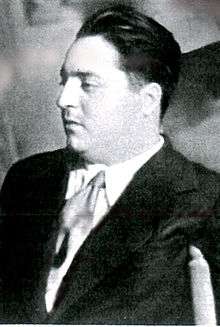Raffaello Matarazzo
Raffaello Matarazzo (17 August 1909 – 17 May 1966) was an Italian filmmaker.
Raffaello Matarazzo | |
|---|---|
 Raffaello Matarazzo (1936) | |
| Born | 17 August 1909 Rome, Italy |
| Died | 17 May 1966 (aged 56) Rome, Lazio, Italy |
| Occupation | Filmmaker |
Life
Matarazzo started writing film reviews for the Roman newspaper Il Tevere before re-editing scripts for the Italian film company Cines. His first films were comedies until he shifted to making melodramas. With Catene, produced by Titanus in 1949, he became the most successful director in Italy. Audience loved his melodramas. Critics, however, have tended to disparage his work, saying that Matarazzo films were Neorealismo d'appendice (neorealism wannabe). Since the 1970s, some film critics have tried to restore Matarazzo's reputation. French magazine Positif loved his erotic-historical peplum Ship of Lost Women.
Filmography
- The Telephone Operator (1932)
- Littoria (1933)
- Fanny (1933)
- Tourist Train (1933)
- Unripe Fruit (1934)
- Kiki (1934)
- The Serpent's Fang (Il serpente a sonagli) (1935)
- Joe the Red (1936)
- The Ambassador (1936)
- The Anonymous Roylott (1936)
- The Carnival Is Here Again (1937)
- It Was I! (1937)
- L'albergo degli assenti (1938)
- The Marquis of Ruvolito (1939)
- Giù il sipario (1940)
- Trappola d'amore (1940)
- Notte di fortuna (1941)
- The Adventuress from the Floor Above (1941)
- Giorno di nozze (1942)
- Dora o le spie (1943)
- Il birichino di papà (1943)
- Empezó en boda (1944)
- Lo sciopero dei milioni (1947)
- The Opium Den (1947)
- Paolo e Francesca (1949)
- Chains (1949)
- Torment (1950)
- Nobody's Children (1951)
- Il tenente Giorgio (1952)
- Who is Without Sin (1952)
- Vortice (1953)
- Ship of Lost Women (La nave delle donne maledette) (1953)
- Torna! (1953)
- The Life and Music of Giuseppe Verdi (Giuseppe Verdi) (1953)
- Schiava del peccato (1954)
- Guai ai vinti (1954)
- The White Angel (1955)
- The Intruder (1956)
- La risaia (1956)
- L'ultima violenza (1957)
- Melancholic Autumn (1958)
- Cerasella (1959)
- I terribili sette (1963)
- Adultero lui, adultera lei (1963)
- Amore mio (1964)
gollark: Idea: automated emergency USB device ejection.
gollark: But it would be hard to emulate one by accident.
gollark: I mean, USB killers exist.
gollark: You can get ESPsomething microcontroller boards which have *builtin* WiFi and are generally more powerful.
gollark: You need extra hardware for wireless stuff.
External links
This article is issued from Wikipedia. The text is licensed under Creative Commons - Attribution - Sharealike. Additional terms may apply for the media files.